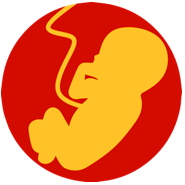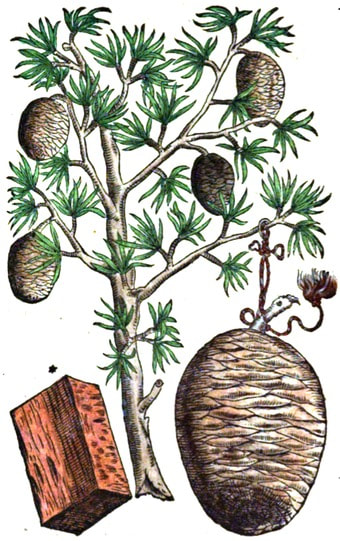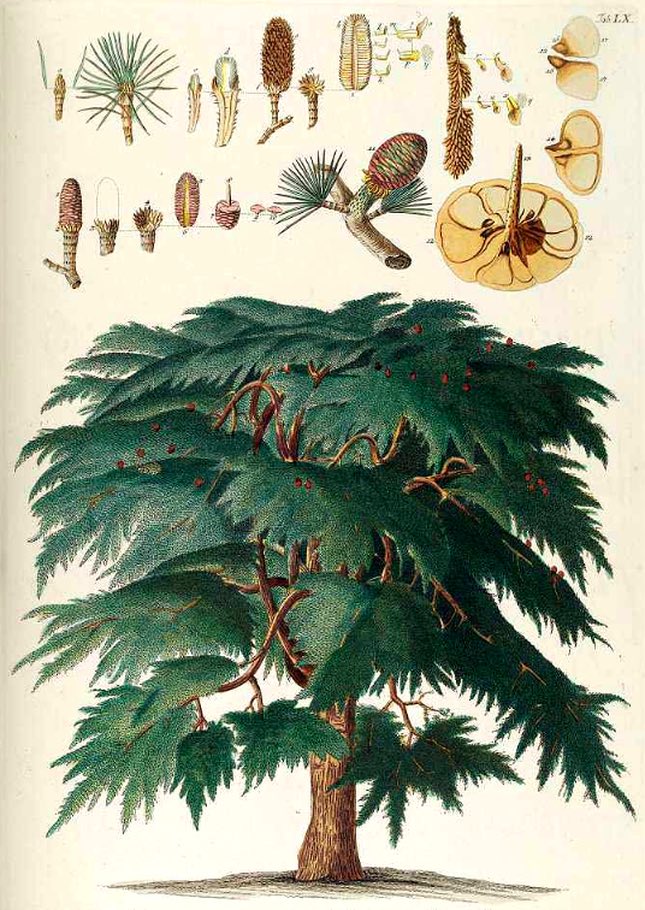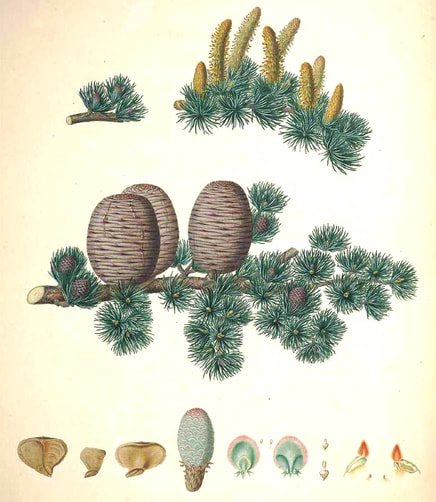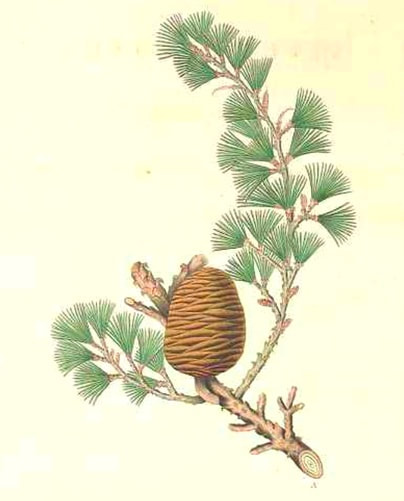Sentry Page Protection
Cedrus libani
Kreutterbuch, Matthiolus, 1586
Kreutterbuch, Matthiolus, 1586
Cedrus libani
C.J. Trew, G.D. Ehret, Plantae selectae, vol. 6 (1760)
C.J. Trew, G.D. Ehret, Plantae selectae, vol. 6 (1760)
Left: Cedrus libani Right: Cedrus deodara
A.B. Lambert, Description of the genus Pinus and some other remarkable plants, 2nd ed., (1890)
A.B. Lambert, Description of the genus Pinus and some other remarkable plants, 2nd ed., (1890)
Botanical name:
Cedrus spp. (syn. Pinus cedrus)
There are three main varieties of Cedar, all used very similarly:
1. C. libani (Cedar of Lebanon)
2. C. deodara (syn. C. libani var. deodara) (Indian Cedar)
3. C. atlantica (African Cedar)
The classical medicine 'Libani' has been said to have been derived by both C. libani and C. deodara, according to different sources.
Parts used:
Leaf; Wood; Resin; Libanol (essential oil from the wood and needles)
Libani, in classical western formula, usually refers to the gum-resin.
Cedria: liquid resin of the tree
Devadaru in Ayurvedic texts refers to the Heart wood.
Temperature & Taste:
Warm, dry. Bitter, Pungent
Resin is hot and dry. "Hot and dry in the fourth degree." (Avicenna)
Cedrus spp. (syn. Pinus cedrus)
There are three main varieties of Cedar, all used very similarly:
1. C. libani (Cedar of Lebanon)
2. C. deodara (syn. C. libani var. deodara) (Indian Cedar)
3. C. atlantica (African Cedar)
The classical medicine 'Libani' has been said to have been derived by both C. libani and C. deodara, according to different sources.
Parts used:
Leaf; Wood; Resin; Libanol (essential oil from the wood and needles)
Libani, in classical western formula, usually refers to the gum-resin.
Cedria: liquid resin of the tree
Devadaru in Ayurvedic texts refers to the Heart wood.
Temperature & Taste:
Warm, dry. Bitter, Pungent
Resin is hot and dry. "Hot and dry in the fourth degree." (Avicenna)
Uses:
1. Clears Cold Phlegm, Stops Cough: (TCM, West)
-Catarrh, chronic Rhinitis (Gum, Oil)
-Cough, Bronchitis, Wheezing, Asthma (Leaf, Oil, Gum, Wood)
-Wind-Cold Cold and Influenza; Fever
-also for Goiter (Ayurveda)
-Tuberculosis (leaves, cones, oil are anti-tubercular)
-resin taken internally to cleanse the Lungs and heal Lung Ulcers (Parkinson)
2. Clears Wind-Damp, Promotes Urine: (Wood; Leaf; Resin; Fruit; TCM, Ayurveda, West)
-Edema, Strangury (Ayurveda–since Sushruta, West)
-Fruit eaten cures Strangury and promotes Urine (Dodoens)
-Arthritis, Sciatica, Rheumatism (Wood, leaf, oil; Hildegard said the green fruits healed Arthritic complaints)
-Stones
-Wind-Damp skin diseases, Eczema, Itching, Leprosy (Wood, Ayurveda)
-obstinate urinary diseases including Diabetes (Wood, Ayurveda–since Charaka)
3. Warms the Stomach, Clears Damp, Regulates Qi:
-Hiccup
-flatulence, Colic, intestinal cramping
-Constipation
-Diarrhea, Dysentery (Wood or Bark)
-clears Ama (toxins from undigested food)
-Hildegard said the dried wood powdered and mixed with honey was beneficial for Splenetic people.
4. Stops Bleeding, Clears Stasis: (TCM; Leaf, Wood)
-Diarrhea, Dysentery with Blood (TCM)
-promotes Menstruation (Dodoens)
5. Kills Worms:
-Worm infestation including Filaria (Wood, since Charaka)
6. Externally:
-Burns
-Rash, Dermatitis, Itching
-Boils, skin eruptions (oil applied)
-Ulcers (powdered wood or oil, Ayurveda)
-Leprosy
-as an oil for Atrophy of the limbs (Sushruta)
-hair oil for Baldness (Sushruta)
RESIN, TURPENTINE:
1. Clears Cold Phlegm, Stops Cough:
-cleanses Cold Phlegm in Cough, Bronchitis, Asthma
-"useful in chronic Cough" (Avicenna)
-"cures the Ulcers of the Lungs when licked" (Avicenna)
2. Clears Wind-Damp, Moves the Blood:
-Arthritis, Rheumatism (internally and topically)
-Resin was used for Leprosy topically & internally in the West
-"Congestion of blood" (Avicenna)
-"Improves the eyesight" (Avicenna)
-"used in Elephantiasis and Varicose veins both when licked or smeared." (Avicenna)
3. Kills Worms:
-"It kills all types of Worms" (Avicenna)
-"When taken as an enema, it kills the intestinal worms" (Avicenna)
4. Externally:
-topically to Snake Bite
-in a gargle for Sore Throat and Tonsillitis
-applied as a caustic to Scars
-(diluted) was used to clears films from the Eyes (Parkinson)
-Ear ache and Tinnitus (diluted and dropped in) (Avicenna)
-applied to a hollow tooth to ease the pain, or dissolved in vinegar to use as a wash. (Parkinson)
-kills Knits and Lice, dissolved in vinegar.
-"Useful in cases of infestation with Lice and their eggs in both men and animals" (Avicenna)
-"Useful in scabies in man and animals" (Avicenna)
-"If applied to the penis before intercourse, it prevents conception." (Avicenna)
Dose:
Heart Wood in Powder: 3–6 grams
Decoction of the Heart Wood (1 in 4): 50–100 mls.
Tincture of the Wood or Needles (1:5 in 50% alcohol): 1–3 mls.
Libani (gum): 100–200mg internally with Honey or mixed with pills or powders
Oil in Capsules: up to 45 grains daily.
The oil is used in ointments, usually around 20–25%.
Comment:
The three species of Cedar have all been used fairly similarly, and all have similar appearance. C. deodara was previously regarded as a variety of C. libani, but was later given its own species. Wood and Leaf (Needles) are used internally, Oil and Resin used externally.
i. WOOD: In Ayurveda, the Heart wood is most used
ii. NEEDLES: used similarly to the wood
iii. BARK: used like the wood, but more astringent.
iv. RESIN is hot and was used in embalming and incense.
v. ESSENTIAL OIL: principally used externally similarly to Turpentine; also internally for Cough and Bronchitis.
Substitutes:
The classical Libanum may be derived from Olibanum, Frankincense. The resin is used similarly, and was classically used in incense, as was Frankincense. Frankincense may be a useful substitute.
Heart Wood in Powder: 3–6 grams
Decoction of the Heart Wood (1 in 4): 50–100 mls.
Tincture of the Wood or Needles (1:5 in 50% alcohol): 1–3 mls.
Libani (gum): 100–200mg internally with Honey or mixed with pills or powders
Oil in Capsules: up to 45 grains daily.
The oil is used in ointments, usually around 20–25%.
Comment:
The three species of Cedar have all been used fairly similarly, and all have similar appearance. C. deodara was previously regarded as a variety of C. libani, but was later given its own species. Wood and Leaf (Needles) are used internally, Oil and Resin used externally.
i. WOOD: In Ayurveda, the Heart wood is most used
ii. NEEDLES: used similarly to the wood
iii. BARK: used like the wood, but more astringent.
iv. RESIN is hot and was used in embalming and incense.
v. ESSENTIAL OIL: principally used externally similarly to Turpentine; also internally for Cough and Bronchitis.
Substitutes:
The classical Libanum may be derived from Olibanum, Frankincense. The resin is used similarly, and was classically used in incense, as was Frankincense. Frankincense may be a useful substitute.
Main Combinations:
1. Catarrh from Cold:
i. Libani gum, Storax, Mastic, Costus, Indian Spikenard
ii. Libani gum, Myrrh, Indian Spikenard, Storax (as in Confection for Catarrh)
2. Cough and Breathlessness from Cold Phlegm obstruction:
i. Cedrus Devadaru (wood) with Chebula and Long Pepper
ii. from Lung deficiency, Libani, Amber, Myrrh, Dragons Blood, Tragacanth, Mastic, Saffron (as in Troches to Strengthen the Lungs, Mesue)
iii. Libani, Horehound, Elecampane, Siler, Gentian, Ginger, Myrrh, Peony (as in Climatio of Nicholas)
iv. Cedrus Devadaru (wood), Chebulic and Emblic Myrobalan, Adhatoda, Ginger (Ayurveda)
3. Indigestion, Bloating, Cedrus Devadaru (wood) with Fennel, Ginger, Bishops Weed seed
4. Diarrhea, Libanum bark, Pomegranate flowers, Sumac, Acorns, Indian Spikenard, Coriander seed, Celery seeds, Galls (equal parts) (as in Powder for Chronic Diarrhea of Nicholas)
5. Edema, Stones, Kidney diseases, Pleurisy, Libani, Cinnamon, Sulphur, Cotus, Myrrh, Pepper in Honey (as in Antidotum Asclepiadus Minus)
6. Acne, Eczema, Itching, Cedrus Devadaru (wood) with Triphala, Cyperus, Swertia, Turmeric, Fumitory, Licorice (as in Mahasudarsana Churna)
7. Muscular Cramps, Spasms, Cedrus Devadaru (wood) with Turmeric and Indian Spikenard
8. Arthritis, Lumbago, Rheumatoid Arthritis, stiffness of the body:
i. Cedrus Devadaru (wood) with Bdellium, Clove, Juniper, Tribulus, Celery seed, Withania, Triphala
ii. make an oil of Cedrus Devadaru (wood) with Tinospora, Costus, Indian Spikenard, Withania, Frankincense to be used externally
iii. make an oil of Cedrus Devadaru (wood) with Costus, Ginger, Calamus, Garlic, Cper root-bark
9. Tremors, Libani gum, Black Myrobalan, Savin, Cyperus, Calamus (as in Expert Confection for Tremors)
10. Goiter, Cedrus Devadaru (wood) with Sida cordifolia and Abutilon, extracted with oil and given internally. (Sushruta Samhita)
11. Headache from Wind, Cedrus Devadaru (wood) with Valerian, Indian Spikenard, Costus, Ginger, mixed with oil and applied topically.
12. Tinnitus, Decoction of Hyssop with Libanum resin is used as a steam or ear drops. (Avicenna, Parkinson)
13. Plaster for Pain and Tumors from Blood stagnation, Libani, Mastic, Myrrh, Terpentine, Gum Ammoniac, Galbanum, Saffron (as in Plaster Oxycroceum)
Major Formulas:
Confection for Catarrh (Mesue)
Expert Confection for Tremors
Troches to Strengthen the Lungs (Mesue)
Powder for Chronic Diarrhea of Nicholas
Antidotum Asclepiadus Minus (Nicholas)
Mahasudarsana Churna
Devadrumadi Churnam
Mandor-Vataka
Indukanta Ghirta
Yogaraja Guggulu
Cautions:
1. Not used in strong Heat conditions.
2. Avoid during pregnancy. The resin 'Kills the living child in the mothers body'. (Parkinson)
3. Hildegard said if Cedar is taken by one in health it will make the body hard and rigid.
Main Preparations used:
1. Not used in strong Heat conditions.
2. Avoid during pregnancy. The resin 'Kills the living child in the mothers body'. (Parkinson)
3. Hildegard said if Cedar is taken by one in health it will make the body hard and rigid.
Main Preparations used:
Click the Tabs above for more information on this Medicine
|
Cedar of Lebanon is said to be the wood used to build Solomans Temple and the Hanging Gardens of Babylon. It has been used for thousands of years as incense, in embalming, and in perfumery. The resin was classically known as the 'Life of the
|
Dead' because it preserved dead bodies from rotting. Himalayan Cedar (C. deodara) is important in Indian culture and in Ayurveda. It is called 'Wood of the Gods'.
|

